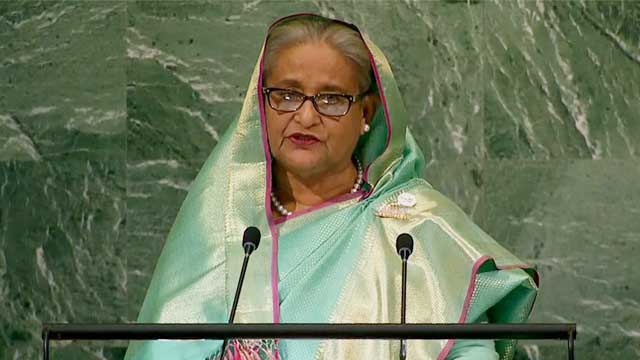Prime Minister Sheikh Hasina today gave utmost importance on dialogue to resolve crises and disputes, urging the world community to stop arms race, war and sanctions for building a peaceful world.
"My urge to the conscience of the world community- stop the arms race, war, and sanctions, ensure food and security of the children; build peace," she said.
The Premier made this call while delivering her speech at the 77th Session of the United Nations General Assembly (UNGA) here in the UN headquarters.
"We believe that antagonism like war or economic sanctions, counter-sanctions can never bring good to any nation," she said, adding "Dialogue is the best way to resolve crises and disputes."
She continued that "We believe without addressing root causes of conflict, we cannot sustain peace."
Wanting to see a peaceful world with enhanced cooperation and solidarity, shared prosperity and collective actions, Sheikh Hasina said "We share one planet, and we owe it to our future generations to leave it in a better shape."
She went on saying that "We want the end of the Ukraine-Russia conflict."
She noted that in punishing one country with sanctions, counter-sanctions, the entire world including women and children are being punished.
"Its impact is not limited to a country, rather puts the lives and livelihoods of the people in greater risk, infringe their human rights; people are deprived of food, shelter, healthcare and education," she said, adding, "Children suffer the most in particular. Their future is lost in darkness."
The 77th session of the UNGA is taking place from September 13 to 27 at the UN Headquarters in New York, in the first in-person format since the outbreak of the COVID-19 pandemic with heads of states and governments from 193 Member States.
The UNGA session is taking place at a time when overlapping crises unfold around the world with food insecurity is looming, humanitarian needs are deepening, climate goals remain largely unmet, inequality is worsening.
The world leaders will exchange statements in-person in the General Assembly Hall, on the theme "A watershed moment: transformative solutions to interlocking challenges" to consider and debate how they can collectively solve the shared problems of present time-and create a more sustainable, more just future for all.
Alongside the Russia-Ukraine war, the peace and stability, climate change, food insecurity, Covid-19 pandemic, Palestine and migration issues among others concerning the global as well as Bangladesh perspectives were prominently featured in Sheikh Hasina's speech in the 77th session of the UNGA.
"Growing food insecurity, energy and economic crisis are affecting us all," she said.
She observed that countries that are already in vulnerable situations needing support to achieve the Sustainable Development Goals (SDGs) will now face even more challenges to achieve the SDGs.
"Today we've reached a critical time, when mutual solidarity must be shown more than at any time in the past. We need to prove that in times of crisis, the UN is the cornerstone of the multilateral system," she said, adding "Therefore, in order to gain the trust and confidence of the people at all levels, the UN must lead from the front and work to fulfill the expectations of all."
In this context, she mentioned about the Global Crisis Response Group (GCRC) and said "as a champion of this group, I am working with other world leaders to determine a global solution commensurate with the gravity and depth of the current situation".
The Prime Minister said that Bangladesh is fully committed to complete disarmament, including the non-proliferation of nuclear weapons and that is why it has ratified the landmark Treaty on the Prohibition of Nuclear Weapons in 2019. "We've consistently implemented our commitment to peacekeeping operations", she added.
As a reflection of our peace-centric foreign policy, she said Bangladesh has consistently demonstrated its commitment to UN peacekeeping operations as the leading troops and police contributing country, presently being the largest.
They (peacekeepers) help maintain peace, support capacity building of national and local institutions, protect the civilians from harm, empower women and other vulnerable communities and build a sustainable society, she said, adding that while performing their duties, many of them died.
The Bangladesh Premier said as the current Chair of the UN Peacebuilding Commission, her country is doing their part by creating a platform for multi-stakeholder engagements in support of the conflict affected countries.
"We are committed to continue our efforts in strengthening the women, peace and security (WPS) agenda," she said.
Mentioning that Bangladesh has adopted a "zero tolerance" policy on terrorism and violent extremism in its land, she said "We do not allow our territory to be used by any party to incite or cause terrorist acts or harm to others."
She also called upon the member states to work together for the conclusion of an internationally binding instrument to tackle cyber-crimes and cyber-violence.
Mentioning the brutal and pathetic tragedy of her life on 15 August 1975 when her father Bangabandhu Sheikh Mujibur Rahman along with most of family members were killed, she said "So, myself as a sufferer, I can rightly realize the pain and agony that people endure due to the horrors of war, killings, coups and conflicts."
She said "Therefore, I don't want war, I want peace, I want welfare for humankind. I want economic development for people. I want to ensure a peaceful world, developed and prosperous life for future generations."
She continued "My earnest appeal to you, 'stop war, stop arms race'. May the values of humanity be upheld."
"Let us join our hands together and build a better future leaving no one behind," she added.





